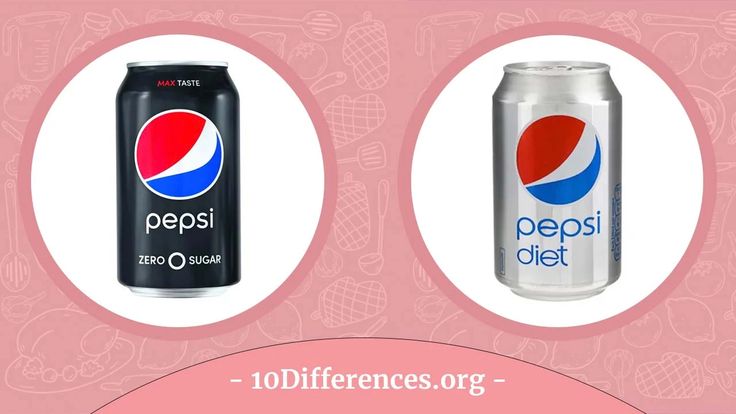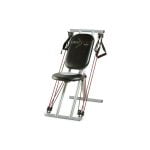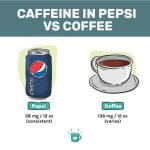Diet Pepsi and Pepsi Zero are two popular types of low-calorie sodas with key differences in sweeteners: Diet Pepsi contains aspartame while Pepsi Zero uses sucralose and acesulfame potassium. In the world of carbonated beverages, there are myriad options to choose from, each claiming to be better than the other.
When it comes to Diet Pepsi and Pepsi Zero, these two contenders stand out with their low-calorie offerings. While both beverages aim to satisfy the cravings of calorie-conscious consumers, they do so using different sweeteners. Diet Pepsi derives its sweetness from aspartame, a zero-calorie artificial sweetener, while Pepsi Zero employs a blend of sucralose and acesulfame potassium.
This distinction in sweeteners sets these carbonated refreshments apart and caters to the divergent taste preferences of cola enthusiasts. We will delve deeper into the differences between Diet Pepsi and Pepsi Zero to help you make an informed choice according to your preferences and dietary needs.

Credit: m.youtube.com
Diet Pepsi
Diet Pepsi and Pepsi Zero are both sugar-free, zero-calorie sodas. While Diet Pepsi uses aspartame and Ace-K for sweetening, Pepsi Zero employs sucralose and Ace-K as its sweeteners. Although both offer a similar taste, the main difference lies in the sweetening ingredients.
Diet Pepsi is a low-calorie carbonated soft drink that was first introduced in 1964. It is a sugar-free and calorie-free alternative to regular Pepsi, sweetened with artificial sweeteners such as aspartame and acesulfame potassium.
Differences:
- Diet Pepsi has a distinct taste that is lighter and less sweet compared to regular Pepsi. It offers a refreshing, crisp flavor with zero calories.
- It is suitable for individuals looking to reduce their sugar or calorie intake without sacrificing their enjoyment of a carbonated beverage.
- Diet Pepsi is available in various forms, including cans, bottles, and fountain drinks, catering to different preferences and occasions.
Pepsi Zero Vs Diet Pepsi
Pepsi Zero and Diet Pepsi may seem similar, but there are key differences between the two. Pepsi Zero is sweetened with aspartame and acesulfame potassium, while Diet Pepsi uses only aspartame. Additionally, Pepsi Zero has a stronger cola taste compared to Diet Pepsi.
Pepsi is one of the most popular soft drink brands, with a wide range of flavors and variations to cater to different tastes and preferences. Two of its popular diet offerings are Pepsi Zero and Diet Pepsi. While both are sugar-free options, there are a few key differences between the two.
Let’s take a closer look:
Pepsi Zero:
- Zero sugar: As the name suggests, Pepsi Zero contains zero grams of sugar. It is sweetened with artificial sweeteners like aspartame and acesulfame potassium.
- Great taste: Despite being sugar-free, Pepsi Zero still provides a satisfying and refreshing taste that closely resembles regular Pepsi. It offers a bold and robust flavor profile.
- Low calorie: In addition to being sugar-free, Pepsi Zero is also low in calories, making it a popular choice for those watching their calorie intake.
Diet Pepsi:
- Zero calories: Diet Pepsi is another sugar-free option that contains zero calories. It is sweetened primarily with aspartame, a low-calorie artificial sweetener.
- Light and crisp: Diet Pepsi is known for its light and crisp taste. It offers a refreshing and bubbly experience that is perfect for quenching your thirst.
- Caffeine content: Unlike Pepsi Zero, Diet Pepsi contains caffeine. This can be a plus for those seeking an extra energy boost throughout the day.
While both Pepsi Zero and Diet Pepsi are great sugar-free options, they do have some differences in terms of taste and ingredients. Whether you prefer the bold flavor of Pepsi Zero or the light and crisp taste of Diet Pepsi, both can be enjoyed guilt-free as part of a balanced diet.
So go ahead and choose the one that suits your palate and lifestyle the best!
Remember, always consult with a healthcare professional or dietitian if you have specific dietary concerns or questions.
Does Diet Pepsi Have Caffeine
Diet Pepsi and Pepsi Zero both have caffeine, but the main difference lies in the sweeteners used. While Diet Pepsi uses aspartame and acesulfame potassium, Pepsi Zero uses sucralose and acesulfame potassium, giving it a slightly different taste.
Diet Pepsi Vs Pepsi Zero: Does Diet Pepsi Have Caffeine?
If you’re someone who loves the fizzy delight of a refreshing cola but wants to watch your calorie intake, you may have found yourself debating between Diet Pepsi and Pepsi Zero. These two sugar-free options may seem similar, but they do have some differences worth exploring.
One of the key questions that often comes up is whether Diet Pepsi contains caffeine. Let’s dive in and uncover the truth.
Does Diet Pepsi Have Caffeine?
Here is what you need to know about the caffeine content in Diet Pepsi and how it compares to Pepsi Zero:
- Diet Pepsi contains caffeine: Diet Pepsi does contain caffeine, although in smaller amounts compared to regular Pepsi. It is formulated with the iconic cola taste but with aspartame (a synthetic sweetener) instead of sugar.
- Amount of caffeine: A 12-ounce can of Diet Pepsi typically contains around 34 milligrams (mg) of caffeine. In contrast, a regular Pepsi cola of the same size packs approximately 38 mg of caffeine. While the difference may not be significant, it can be appealing for those looking to cut down on their caffeine intake.
- Pepsi Zero has more caffeine: Pepsi Zero Sugar, on the other hand, contains a slightly higher amount of caffeine than Diet Pepsi. A 12-ounce can of Pepsi Zero Sugar usually packs around 69 mg of caffeine. It aims to offer the familiar Pepsi taste without the sugar content, while still delivering a caffeinated kick.
- Personal preference matters: Ultimately, whether you choose Diet Pepsi or Pepsi Zero depends on your personal preferences. If you’re looking for a sugar-free option with a slight caffeine boost, Diet Pepsi can be a suitable choice. However, if you prefer a stronger caffeine kick without the sugar, Pepsi Zero Sugar may be more up your alley.
Both Diet Pepsi and Pepsi Zero provide alternatives to traditional sugary sodas without compromising on taste. The decision, ultimately, comes down to your taste preferences and your desired caffeine intake.
Remember to enjoy these drinks in moderation, and as always, consult with a healthcare professional if you have specific dietary concerns or restrictions. Cheers to finding your perfect companion beverage!
How Much Caffeine In Diet Pepsi
Diet Pepsi and Pepsi Zero have the same amount of caffeine, which is 34 mg per 12 fl oz.
What Is The Difference Between Diet Pepsi And Pepsi Zero?
If you’re a fan of Pepsi but trying to watch your calorie intake, you may be considering either Diet Pepsi or Pepsi Zero as a lower-calorie alternative. While both options offer a reduced-calorie version of the classic Pepsi taste, there are some differences between the two.
We will specifically explore the caffeine content in Diet Pepsi and Pepsi Zero.
How Much Caffeine In Diet Pepsi:
When it comes to caffeine content, Diet Pepsi and Pepsi Zero are quite similar. Both beverages contain caffeine, although the exact amount may vary slightly depending on the country and market. On average, a 12-ounce (355 ml) serving of Diet Pepsi or Pepsi Zero contains around 35-38 milligrams of caffeine.
Here are some key points to note about the caffeine content in Diet Pepsi:
- Diet Pepsi contains approximately 35-37 milligrams of caffeine per 12-ounce (355 ml) serving.
- The caffeine in Diet Pepsi provides a mild energy boost and can help to increase alertness.
- The caffeine content in Diet Pepsi is significantly lower compared to regular Pepsi, which contains around 38-42 milligrams of caffeine per 12-ounce (355 ml) serving.
- The caffeine content in Diet Pepsi is also lower than some other carbonated soft drinks on the market.
To summarize, if you’re looking for a low-calorie alternative to regular Pepsi without sacrificing the caffeine kick, Diet Pepsi and Pepsi Zero are both suitable options. However, it’s worth noting that individual sensitivity to caffeine may vary, so it’s always a good idea to check the specific caffeine content in your region or consult with a healthcare professional if you have concerns about caffeine intake.
So, whether you prefer the classic Diet Pepsi or the newer Pepsi Zero, you can enjoy the great taste of Pepsi with a reduced calorie count and a moderate amount of caffeine.
Does Diet Pepsi Have Aspartame
Diet Pepsi contains aspartame, while Pepsi Zero does not. Aspartame is a low-calorie artificial sweetener that gives Diet Pepsi its sweet taste without adding extra calories. Pepsi Zero, on the other hand, uses a different sweetener blend that does not include aspartame.
The Difference Between Diet Pepsi And Pepsi Zero: Does Diet Pepsi Have Aspartame?
With a multitude of beverage options available in the market today, it’s important to understand the differences between various products. Two popular choices for those looking to reduce their calorie intake are Diet Pepsi and Pepsi Zero. If you’re wondering whether Diet Pepsi contains aspartame, read on to find out more.
What Is Diet Pepsi?
- Diet Pepsi is a sugar-free, low-calorie variation of the classic Pepsi cola.
- It is sweetened with sucralose and acesulfame potassium instead of sugar.
What Is Pepsi Zero?
- Pepsi Zero is another sugar-free alternative from PepsiCo.
- It provides the same great taste as regular Pepsi but with zero calories.
- Unlike Diet Pepsi, it is sweetened with aspartame.
Does Diet Pepsi Have Aspartame?
- No, Diet Pepsi does not contain aspartame.
- Instead, it uses a combination of sucralose and acesulfame potassium to provide sweetness without the added calories.
Aspartame is an artificial sweetener used in many low-calorie and sugar-free products. While some people have concerns about its safety or taste, Diet Pepsi offers an alternative option without aspartame. The use of sucralose and acesulfame potassium instead of aspartame allows individuals to enjoy the great taste of Pepsi without guilt.
Both Diet Pepsi and Pepsi Zero offer sugar-free alternatives to regular Pepsi. Diet Pepsi uses sucralose and acesulfame potassium for sweetness, while Pepsi Zero uses aspartame. For those looking to avoid aspartame, Diet Pepsi is a great choice, providing a refreshing and guilt-free beverage option.

Credit: www.sheknows.com
Frequently Asked Questions For What Is The Difference Between Diet Pepsi And Pepsi Zero
Are Pepsi Zero And Diet Pepsi The Same?
Yes, Pepsi Zero and Diet Pepsi are similar as they are both sugar-free cola beverages marketed by PepsiCo.
Is Pepsi Zero Better For You?
Pepsi Zero is a sugar-free option with zero calories, making it a better choice for those looking to cut back on sugar and calories. However, it still contains artificial sweeteners and should be consumed in moderation as part of a balanced diet.
Is Diet Or Zero Sugar Better?
Zero sugar is better than diet because it eliminates sugar, while diet products may still contain some. Zero sugar options help in reducing the intake of added sugars and can be beneficial for those looking to manage their weight or control blood sugar levels.
Why Does Pepsi Zero Taste Different?
Pepsi Zero tastes different due to its unique formula and ingredients used to create a distinct flavor. The combination of these elements sets it apart from other Pepsi products and contributes to its distinctive taste.
Conclusion
To summarize, while both Diet Pepsi and Pepsi Zero offer zero sugar options, they do differ in terms of their sweeteners and taste profiles. Diet Pepsi uses aspartame and acesulfame potassium, resulting in a more traditional cola flavor. On the other hand, Pepsi Zero utilizes sucralose, providing a slightly sweeter taste.
Ultimately, the choice between the two will depend on personal preferences and dietary needs.
More Post:
- Ztec100 Tech Fitness: Unleash Your Full Potential – 2024
- World GYM San Diego Reviews 2024
- Why am I Gaining Weight on the Carnivore Diet?
- Whats the Max Health of Faeburrow
- What is Vabbing at the Gym? Uncovering the Viral Fragrance Trend
- What Is The Difference Between Diet Pepsi And Pepsi Zero
- What is the Cardboard Diet? Discover the Surprising Secrets and Benefits!
- What is The Best Exercise To Lose Weight?
- What is a Point of Focus During Health Inspections?
- What is a Low Fiber Diet Colonoscopy: Prep Essentials – 2024
- What Happened To Mario Lopez Health?
- Weight Loss Warriors: Achieve Success with Power Words
- Weider Home Gym Review: Transform Your Workout Space!
- Washington Health Plan Finder Income Guidelines Cost sharing Reduction
- Vabbing at the Gym: A Unique Fitness Experience
- Upper Body Workout for Basketball Players Maximize Strength and Performance
- Unveiling the Secrets of Gym Tarkov : A Fitness Odyssey
- Unveiling the Secret: Chocolate Filled Caramel Health Benefits
- Unleashing the Power of TEG Gym for Your Ultimate Fitness Adventure
- The Best Tips from Hill Holliday Health Experts
- Tanning Bed Levels at Planet Fitness: Unveiling the Ultimate Power to Achieve a Perfect Tan!
- Schwinn Exercise Bike: Ride to Fitness with the Ultimate Power Machine
- Russian Gymnast Diet: Power Up Your Performance
- Russian Gymnast Diet Before After Transformative Meal Plan for Optimal Performance
- Russian Gymnast Diet Are They Safe Nutrition Regimen
- Push Health Revolution: Optimize Your Wellness Today!
- Planet Fitness Free Summer: Your Ticket to a Fit and Fun Season
- Planet Fitness Equipment: Unleash Your Inner Workout Beast with Our Top Gear!
- Outback Steakhouse Keto Diet: Delicious Low Carb Options
- My Boyfriend Broke Up With Me And I Want Him Back
- Most Affordable GYM Clothes For Women 2024
- Moobs Before and After Weight Loss: Power Words for a Transformation
- Modifying Your Personal Action Plan Can Impede Personal Fitness Goals
- Mexican Meal Prep Weight Loss: Delicious and Effective Meal Planning Strategies
- Marcy Home Gym Workout Routine: Get Fit Faster with These Power Moves
- Ingredients in C4 Pre Workout: Unlocking Energy & Focus
- How To Qualify For Home Health Care Under Medicare – 2024
- How to Have a Healthy Relationship After a Toxic One
- How To Do Good Morning Exercise: Master the Power of a Morning Workout
- How Much Weight Can I Lose in 150 Days: Achieve Remarkable Results!










